With the homemade rocket strapped high above them, the crew pauses for a moment of quiet reflection at the base of the launcher. Then they scribble.
“Ha, sii, saam, soong, nung…” a male voice echoes through the speaker, counting down from five. Soon a thick cloud of smoke has enveloped the dusty field, the ground rumbling as a ‘top secret’ gunpowder mixture propels the colorful device high into the air. Delighted cheers break out; Spectators following the straight climb to the north are impressed.
“I love seeing them leave,” says 70-year-old Brasart, exchanging stacks of money while gambling on the edge of the danger zone. ‘The missiles [have] I have grown so much bigger than when I was young.”
Thousands of these missiles will be launched in northeastern Thailand and parts of Laos this month, as the region celebrates Bun Bang Fai with parades, parties – and PVC rockets packed with explosives.
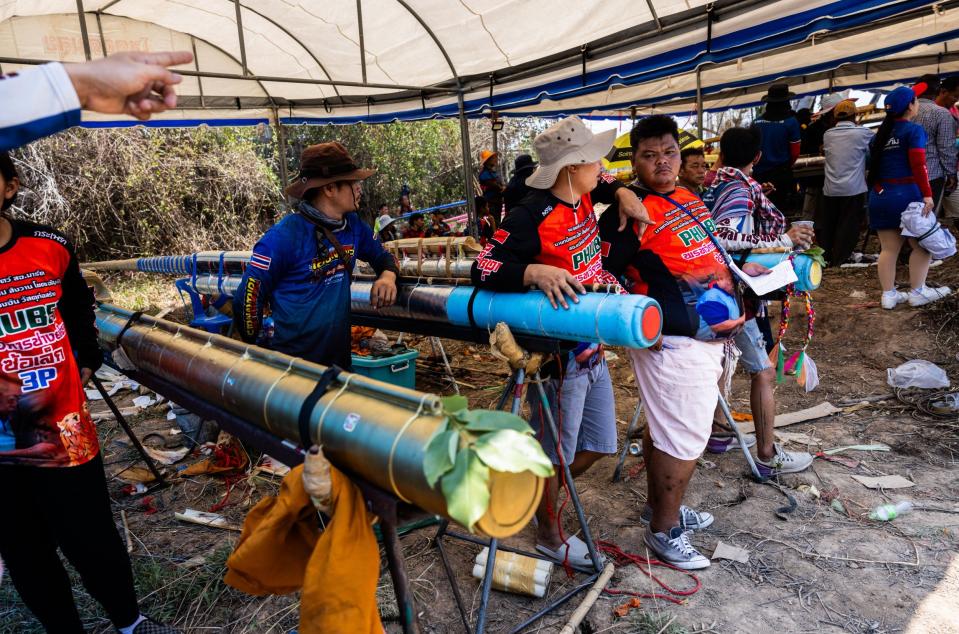
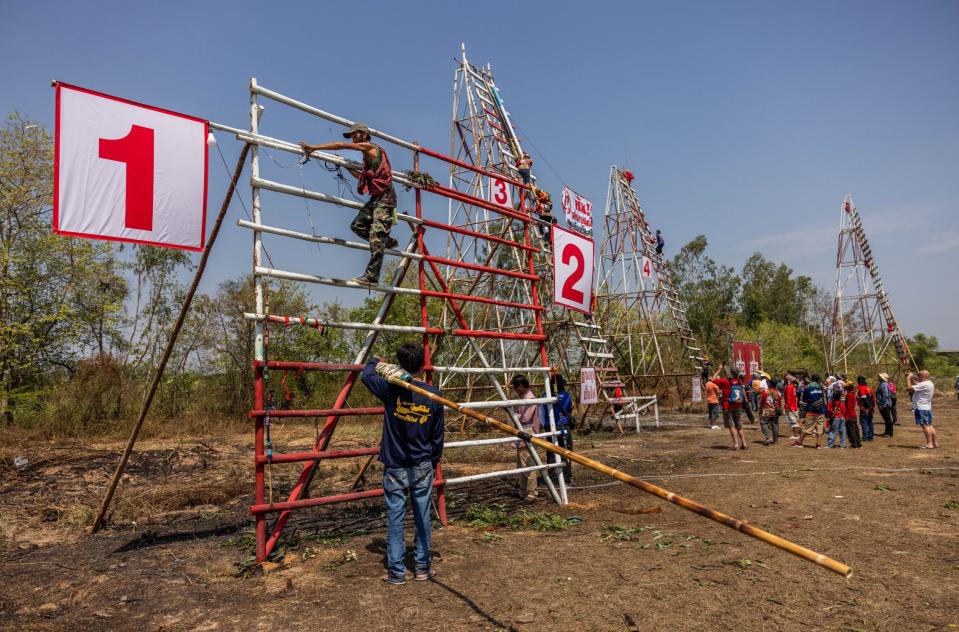

But the ancient Buddhist festival is also a tribute to the gods; a creditable reminder to realize a bountiful monsoon season for farmers’ fields.
And that rain has never been more necessary.
“This year has seen the lowest total rainfall on record, with almost no rain in February and March,” said Dr Theepakorn Jithitikulchai, an economist and climate researcher at Thammasat University in Bangkok. “As of April 28, national cumulative rainfall is 74 percent lower than the [average]…compared to the past three decades.”
Temperatures are also scorching, with Southeast Asia enveloped in an unprecedented heatwave with closed schools and overloaded power grids. In Thailand, where temperatures have exceeded 43 degrees Celsius in 16 provinces, a record 61 heat-related deaths have been reported.
“Thailand’s farmers are on the front lines of climate change as the ‘global boil’ intensifies extreme weather,” said Dr Jithitikulchai. “Thailand’s climate is changing – rising temperatures and decreasing precipitation are clear trends over the past decades.”
The northeastern region of Isaan is one of the worst affected areas, he added. And here in Yasothon, a small town that is home to perhaps the most famous and raucous rocket festival, farmers are feeling the pressure.
“It’s been very dry and very hot in recent years, and this year the rain will probably come even later,” says Nab, as he watches a crew climb up the rickety, ladder-shaped launcher to set up their rocket. “I am very concerned, it is the biggest problem for the people here – 80 percent of the population here are farmers.”
The 19-year-old, whose family has been working in the fields here for generations, is especially concerned about his rice field.
The crop is not only sensitive to high temperatures (one study found that every 1 degree peak in average night-time temperature corresponds to a 10 percent yield loss), but also requires enormous amounts of water. On average, 2,500 liters of water are needed to grow 1 kg of rice.
“We can grow much less rice than before,” says Nab. “I’m 50/50 on whether [the festival] really makes the God of Rain help us. But a lot of people believe so… If the rain still doesn’t come, then I guess I’ll have to do something else.”
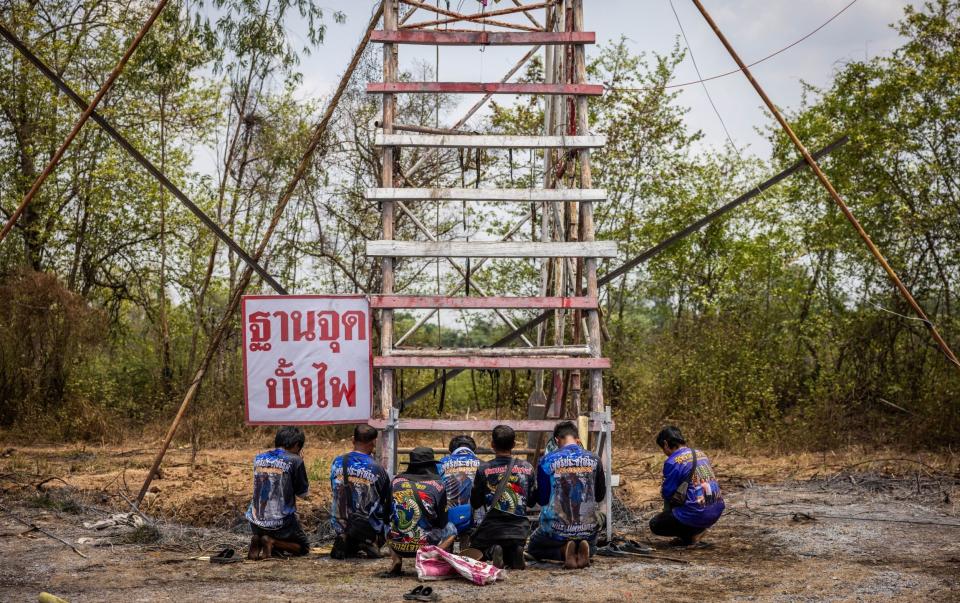



Academics say that while variable rainfall and higher temperatures are the result of climate change (a study on Wednesday found scorching April temperatures were 45 times more likely due to global warming), the scenario has been exacerbated by the latest El Niño.
The weather phenomenon, which occurs every three to seven years, is caused by an unusual warming of the Pacific Ocean. The impacts vary globally, but in Asia it is associated with reduced rainfall and rising temperatures.
Still, there could be some relief for Thailand’s farmers later this year, said Beau Damen, a climate official at the Food and Agriculture Bureau in Bangkok.
“Right now we’re looking at a possible transition period out of El Niño, and it’s looking more and more like we’re going straight into La Niña,” he says. “Normally in this part of the world that would be positive in terms of rainfall.”
According to the latest predictions from the US Climate Prediction Center, there is a 69 percent chance that this could develop between July and September.
But unless global warming is slowed, life for Thai farmers and their counterparts in Southeast Asia will only become more challenging, says Dr Witsanu Attavanich, an environmental economist at Kasetsart University in Bangkok.
“These heat waves will get worse… [and] Thailand’s agricultural sector is expected to suffer further damage in the future,” he said, adding that farmers he surveyed have already seen rice yields drop by 30 to 50 percent. This is not the only crop affected.
“Yields of aromatic coconuts have decreased due to extreme heat,” said Dr. Attavanich. “Farmers who grow durian, the high-value crop, are also facing a shortage of water.”
According to a forthcoming study by Dr. Attavanich, Dr. Jithitikulchai and their colleagues, total agricultural production in Thailand could fall by 10 percent for every percentage point increase above average annual temperature.
The article, which will soon be published in the journal Climatic Change but is seen by the Telegraph, calls on farmers to diversify their crops to protect themselves from the effects of extreme heat. But as it stands, single-crop farming is on the rise in Thailand, while the share of irrigated farms fell from 25 percent in 2007-2016 to 19 percent in 2020.
“It doesn’t look very promising,” says Dr. Jithitikulchai. “These trends suggest a possible shift towards less sustainable agricultural practices… we need a more sustainable future.”
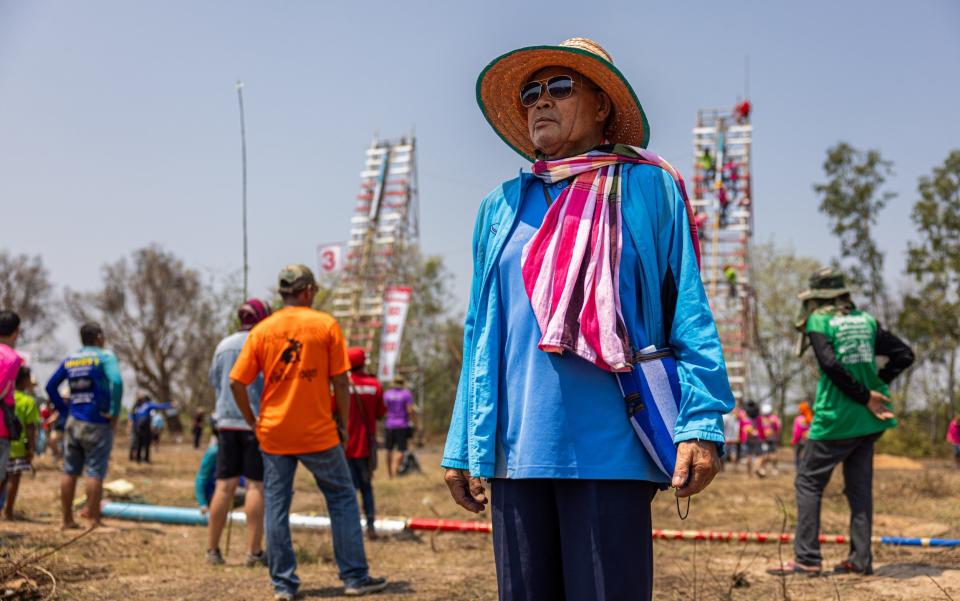

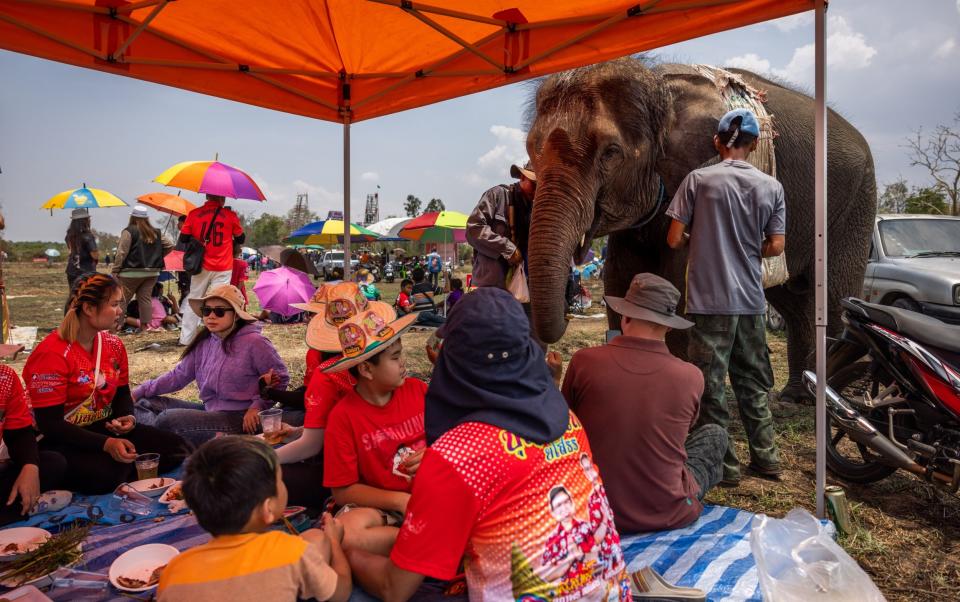

Back in Yasothon, there are mentions everywhere of both the God of Rain and the Toad Prince, key figures from the legends from which the festival emerged. Meanwhile, rockets and flares fly into the air as spectators (including, from somewhere, an elephant) gather under gazebos and parasols to seek refuge from the scorching temperatures; some even dive into muddy water holes to cool off.
At the end of the weekend, the winning rockets – the ones that have spent the most time in the air, from take-off to the moment they land (hopefully in a field, the Telegraaf is confident that the angle of the launcher has been carefully is constructed to avoid the city) ) – is picked.
“More than 20 years ago, some people got hurt, but now people are much safer,” said Brasart, wearing a wide-brimmed rattan hat and aviator sunglasses. “Every year I like this event more than any other festival.
“We do it to encourage the rain, many people still believe in this,” he adds. “So it is a must to do every year. We have to let the rockets go off, otherwise there will certainly be no rain.”
Protect yourself and your family by learning more about it Global health security